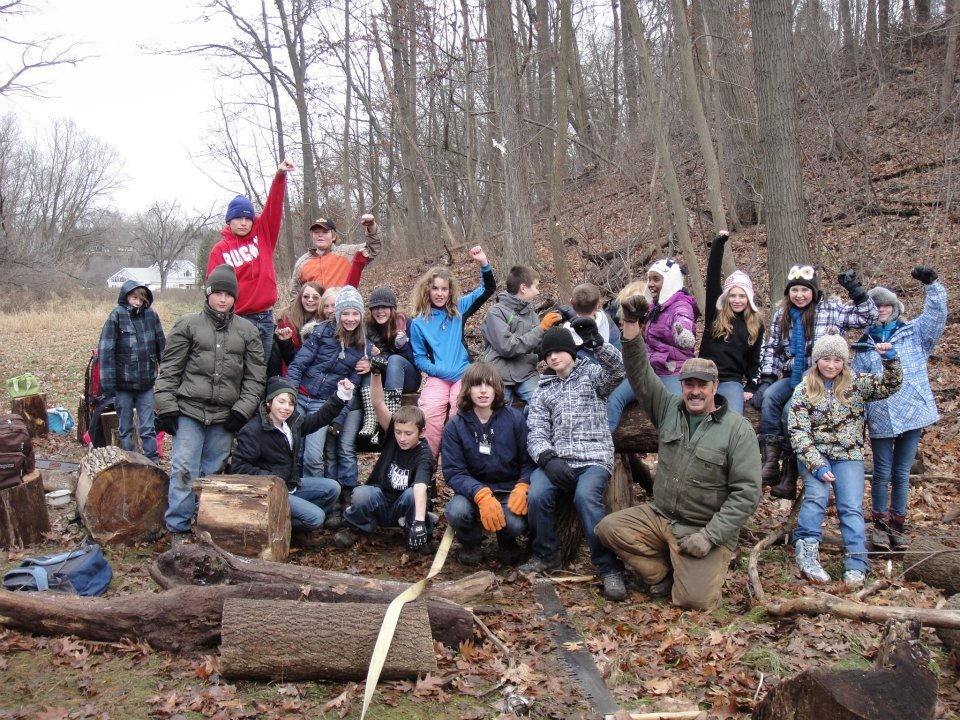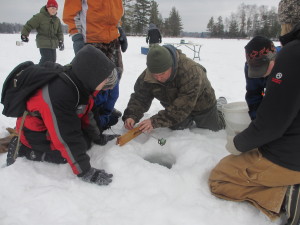By. Cyndy Merse, GSNN Content Writer
Developing meaningful, place-based outdoor curriculum can be a challenge for teachers. Many are faced with few resources, little time, high achievement demands, and little to no experience with environmental and outdoor education. The Wisconsin Green Schools Network (WGSN) is working to change this through their F.I.E.L.D. Corps program, a unique model of teaching environmental education that is winning over teachers in Wisconsin and having a lasting impact on students.
From the Classroom to the Field
F.I.E.L.D. Corps, which stands for “Fostering Inquiry and Empowering Learners through Discovery,” was started in 2002 to engage Wisconsin students more fully in their learning experiences by using nature as a catalyst. The program was initiated through a partnership between a wetland restoration ecologist and classroom teacher at River Crossing Environmental Charter School in Portage, Wisconsin. This initial partnership proved to be so successful that additional schools throughout the state began to show interest and wanted to get involved.
Under the F.I.E.L.D. Corps model, a field biologist is paired with a teacher to conduct weekly field experiences with students that are not only tied to core classroom curricula, but also contribute to real-world community environmental projects. The field biologist acts as a mentor by guiding both the teacher and the students through the project process. F.I.E.L.D. Corps biologists possess a wide range of skills and qualifications including an in-depth knowledge of natural resources and ecology, familiarity with environmental history, hands-on land restoration skills, and an ability to engage and effectively communicate with students.

Photo courtesy of Sandra Benton
F.I.E.L.D. Corps partnerships begin over the summer with the teacher and the field biologist working together to identify suitable learning experiences that combine rigorous academics with ecologically sound community projects. When planning the learning experiences, they use a mix of outdoor, place-based, service-learning, project-based, and experiential learning methodologies. F.I.E.L.D. Corps refers to these methods collectively as “community-based environmental education,” where students are using the world around them as a context for learning.
Students are presented with the project options at the start of the school year and collectively choose a stewardship project to implement and work on each week throughout the duration of the program. This intensive weekly immersion in outdoor education often consists of 6-10 hours of field work for the students, regardless of the season and weather conditions. During the remaining four classroom days, the teacher and students explore the project topics in a more academic manner through research and acquiring the skills needed to implement the project.
Educating Teachers and Students
F.I.E.L.D. Corps is an educational experience for both teachers and students. Although teachers may be willing and enthusiastic to implement outdoor education in their classroom, many lack the background knowledge and expertise in environmental science and are often too busy to coordinate projects that support hands-on, field-based learning. F.I.E.L.D. Corps biologists support teachers by taking students into the field and act as coaches as they work with teachers to develop the environmental education teaching skills needed to carry out these types of educational experiences on their own. As a result of these partnerships, teachers are more confident and prepared to lead their own field days with their classes.
F.I.E.L.D. Corps provides students with a unique opportunity to tie classroom learning with hands-on field work. In the classroom, students prepare for projects and come to understand the issues involved while learning the skills needed to master core concepts in language arts, math, social studies, and science. In the field, students work with the field biologist to leave their mark on the landscape and in their community through restoration and habitat projects or service-learning experiences. Past projects have included:
- Heading up a shoreline buffer zone garden project
- Reshaping and restoring eroding shoreline on a formerly dam controlled river
- Participating in water drain stenciling and citizen science stream monitoring
- Building handicapped accessible wildlife viewing platforms
- Designing and building a rain garden
- Restoring a degraded wetland system in a city park to mitigate urban runoff
- Growing food for a local food pantry
Partnership has Lasting Impact
Although F.I.E.L.D. Corps is still a relatively new program, it has already had an immense impact on the students and teachers it has touched. By working one-on-one with classes over an extended time period, the field biologists have been able to build long-term relationships with the students and teachers, serving as mentors and role models. Teachers gain confidence in their environmental education teaching skills and are able to connect through the F.I.E.L.D. Corps network with other schools to ask questions, share concerns, and learn best practices. Skylar Primm, a teacher at High Marq Environmental Charter School who has been involved with F.I.E.L.D. Corps for the last five years can relate: “Participating in F.I.E.L.D. Corps has had a great influence on my teaching style. As a teacher, it is easy to get stressed out over meeting standards and others’ expectations. The F.I.E.L.D. Corps program has reminded me how important it is to have fun while learning…and the networking opportunities with other schools makes me feel like we are all in this together.”

Photo courtesy of Brittany Roberts
However, students are the real benefactors of the F.I.E.L.D. Corps program. The outdoor learning experiences have provided motivation for many to come and participate in school. Engaging in field work empowers students, helps them find their place in the community, and demonstrates how taking action can make a difference for other people and the environment. Student achievement has also increased on state standardized tests. An analysis of state testing of WGSN schools (i.e., schools using the environment as a context for learning) showed that students performed better than the state average in all tested subject areas in 4th, 8th, and 10th grades over a four-year period. In addition, students have reported higher than average perceptions of self-efficacy, esteem, and positive feelings about school, as documented by the Hope Survey. Mr. Primm has seen first-hand the impact that F.I.E.L.D. Corps has had on his students. “It builds their confidence, gets them active outdoors, and encourages them to work together toward a common goal.”
Most importantly, F.I.E.L.D. Corps is impacting students beyond their participation in the program. Student alumni have gone on to pursue careers in environmental fields, from fisheries biology to environmental engineering. Some have even become teachers themselves and participate in F.I.E.L.D. Corps with their classes. Many other students retain personal connections to the environment as a result of their experiences with the program.
Looking Forward
Demand for hands-on, field-based education continues to increase as teachers and school leaders realize the benefits these programs confer on students. F.I.E.L.D. Corps is continually looking for ways they can expand their programming to more schools in Wisconsin, going so far as to consider other models that better meet the needs of schools who cannot commit to 36 days of field instruction. One idea WGSN is exploring is a mobile lab program that can provide the technical assistance needed to complete projects in a shorter span of time. However the program may evolve, the heart of F.I.E.L.D. Corps will continue to be the field biologists who are the critical link between the classroom and the field in developing environmental literacy in the students and teachers at the schools they serve. “Our program would not be possible without our field biologist,” said Mr. Primm.
References
Interview with Victoria Rydberg, Environmental Education Consultant, Wisconsin Department of Public Instruction
Wisconsin Green Schools Network’s F.I.E.L.D. Corps website (eeinwisconsin.org/resource/about.aspx?s=100785.0.0.2209)
